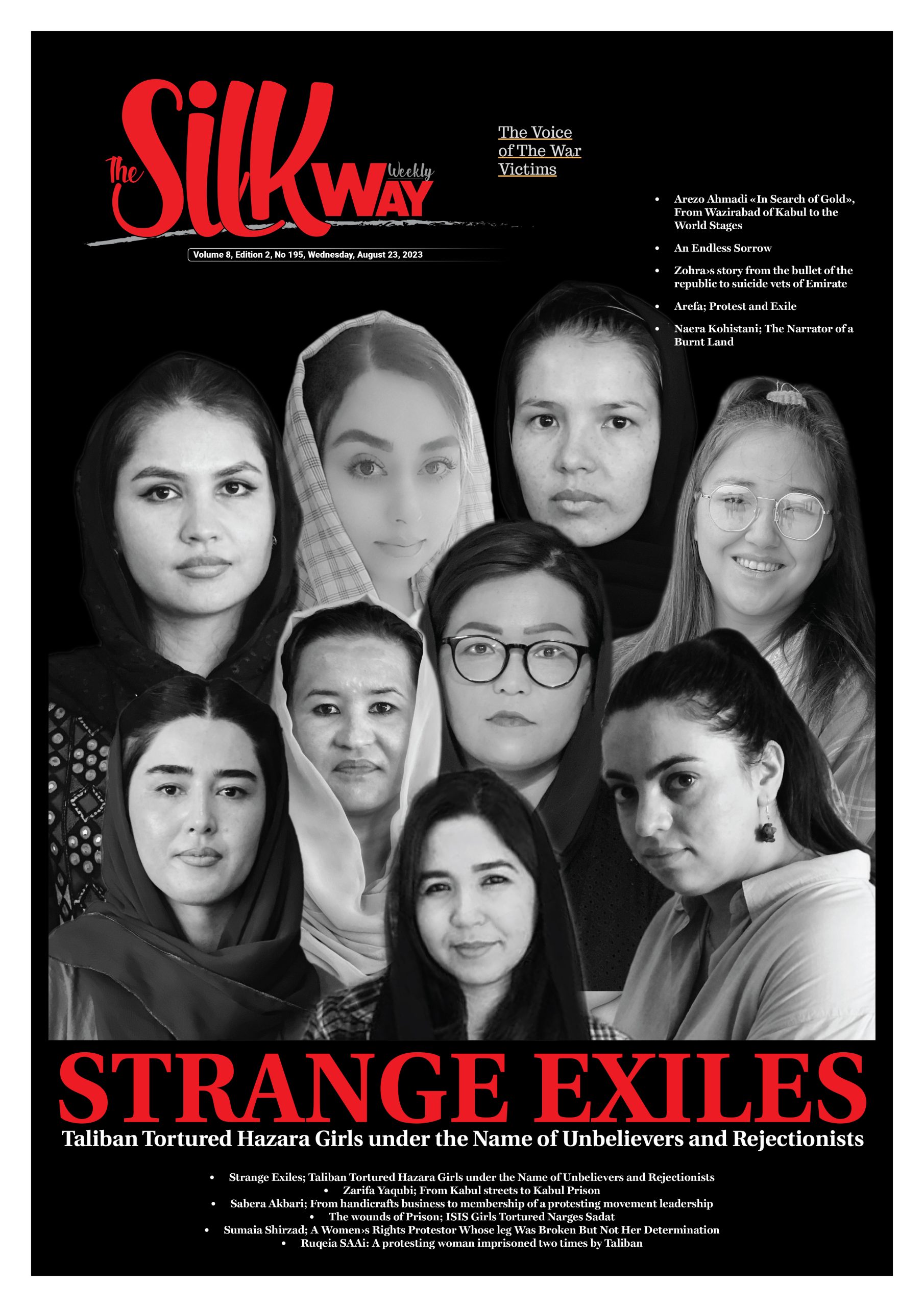 By: Farhad Kohistani
By: Farhad Kohistani
Translated by: Mohammad Rezaie
I had gone out of home for buying something; There was chaos in the city. The markets were closed and people were running in a hurry. My husband, Jawad Akbari, called me and said we must get ourselves home. He told me that the security forces were running out of the city and Taliban had entered Kaul. Before the Taliban take over, Sabira Akbari made a living by selling agricultural and handicrafts products online. She had worked in this sector since 2016 and whenever there was an agriculture exhibition, she would have participated in it to exhibit her products. She bought agriculture products from Daikondi and sold them in Kabul.
When Sabera became a mother, she further focused on selling handicrafts online and also about 5-6 other girls worked with her. This situation did not last much and when Taliban captured Kabul everything changed dramatically and her business stopped.
When Taliban imposed restrictions on women, a number of businesswomen, politicians, reporters and women’s rights activists formed a WhatsApp group to start civil protests against Taliban restrictions on women and Sabera Akabri joined the group as well. “We discussed in this chat group that if women do not raise their voice Taliban will not respect their rights” she says. Members of this WhatsApp group decided to take to the bloody streets of Kabul to advocate for their rights. Sabera knew very well that Kabul streets had the smell of blood in the throat of Tabassom; the blood of demonstrators of the enlightenment movement has not been wiped from the walls of Dehmazang. She knew the forces of republic responded with bullets to demonstrations but Taliban will respond with suicide vests in order to suppress and torture the demonstrators. Sabera went to the streets with all fears and dangers facing her. On September 3, 2021, a number of women’s rights protestors held a protest march in Fawar e Ab square beside the presidential palace and chanted “Education, Work, Freedom! Toward Freedom. “Taliban treated the demonstrating women violently. They beat women and broke the cameras of the journalists and photographers. They chased protesting women.” Sabera Says. This protest was organized when the all-male and Pashtun ethnic cabinet of Taliban was announced and had no women member and also had abolished Ministry of Women Affairs and Ministry of Ordering to Virtue and Prohibiting from Vice was established to further suppress women. According to Sabera, later those women who had organized this protest were scattered and some of them left Afghanistan.
For a more organized struggle, we formed “Movement of Afghan Justice Seeker Women”, Sabera says. The movement has no leader and decisions are made as a group.
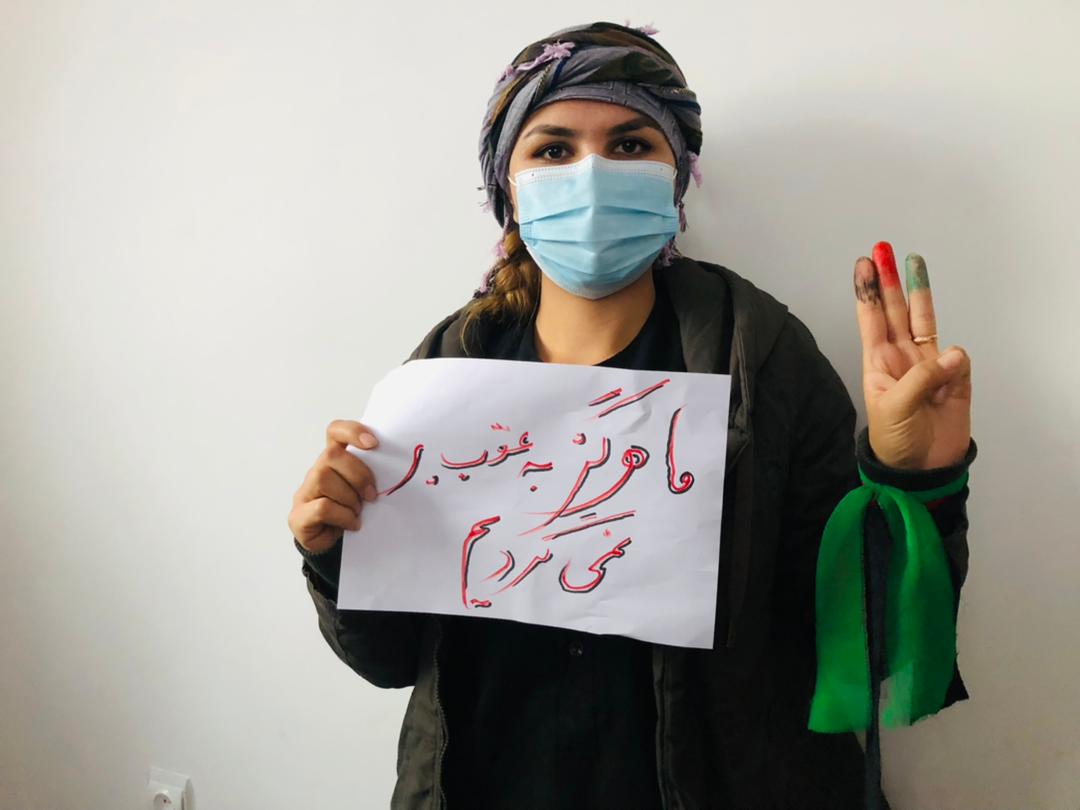 On September 5, 2021, Taliban issued a six-point command on restricting women freedom. In response to this order, Movement of Afghan Justice Seeker Women, held a press conference in Pul e Sorkh of Kabul. In addition to this, Movement of Afghan Justice Seeker Women, held a protest march in Shahr e Naw of Kabul which about 50 women and girls had participated in this march. Also, Afghan Women Self-Formed Movement” had participated in the march chanting “Bread, Work, Freedom”. According to Sabera Taliban militants violently dispersed the peaceful protest by firing guns into the air and beating the protestors.
On September 5, 2021, Taliban issued a six-point command on restricting women freedom. In response to this order, Movement of Afghan Justice Seeker Women, held a press conference in Pul e Sorkh of Kabul. In addition to this, Movement of Afghan Justice Seeker Women, held a protest march in Shahr e Naw of Kabul which about 50 women and girls had participated in this march. Also, Afghan Women Self-Formed Movement” had participated in the march chanting “Bread, Work, Freedom”. According to Sabera Taliban militants violently dispersed the peaceful protest by firing guns into the air and beating the protestors.
Movement of Afghan Justice Seeker Women held a protest march on 28 December 2021 in Pule Sorkh, voicing their support for former national security forces who were killed on purpose by Taliban. “We started our protest march from Habibai High School to Pul e Sorkh.” She says. “In Pul e Sorkh, Taliban violently suppressed the protestors and beat the journalists. Taliban took some reports to police district 3 and tortured them.” Sabera says. Following this, she went to police district 3 to urge Taliban to release the reporters. Taliban did not allow her to enter the police district but took her photo and the next day Taliban asked girls in Onchi check point to identify Sabera.
When the protestors went from police district three to Pul e Sorkh, the Taliban special forces accompanied them and surround them. The Taliban special forces insulted and threatened the protestors not to organize such protest march in the future. “They had decided to detain the protestors. I told the girls they must escape and disperse. We had already considered such scenarios. As a result, we wore comfortable shoes. We always had two veils in order to wear them when it was necessary and not to be identified easily. We always had extra veils.” Sabera says.
According to Sabera many members of Movement of Afghan Justice Seeker Women were detained and imprisoned by Taliban.
Afghan women’s rights activists continue defying Taliban to retake their rights though Taliban increasingly issued restrictive edicts on women.
On January 7, 2022, Afghan women’s rights protestors wearing man clothes held a protest program in Sabera’s house. These girls protested against Taliban edict not allowing women coming out of home without a chaperone.
When Sabera and her friends lost their patience and found all ways closed on themselves, they started writing on the walls. On 9 January they started protest graffiti wall. “It was very hard to protest at that time. If we kept silent Taliban would have been emboldened. We decided to raise the awareness of the people, protest and express women’s demands.” Sabera says. Sabera and her friends went out in groups of two or three and wrote on the walls “Bread, Work, Freedom”, “Anti-women law shall be abolished” and “Afghan Women do not recognize Taliban.”
On 16 January 2022, Sabera and her comrades held a protest march near Kabul university, against Taliban, protesting killing Zainab Abdullahi in Dasht e barchi, disappearance of Alia Azizi and those girls who were shot in Balkh. But Taliban violently dispersed the protestors by spraying pepper shields on their and heads and faces firing guns into the air. Taliban had electric shocks and tried to ran over the girls with ranger vehicles.
Sabera and women’s right protestors took to street on 17 January 2022 to protest against forced marriage by performing a theatre. Taliban started arresting women’s rights protestors on 19 January 2022 again. Women’s rights protestors were detained from homes and streets.
 When the process of arresting women’s rights protestors started by Taliban, organizations involved in the evacuation process, shifted women to shelters until they were sent abroad. Sabera and some other women’s rights protestors were transferred to a shelter in Shahre naw on 25 January 2022. Sabera remained for 28 days in a shelter. Then another organization which was involved in the evacuation process moved a number of these girls and women to another shelter in Shirpor. Following this, Taliban arrested 29 women and girls along with their family members from the same shelter and imprisoned them. Fariza, Sabera’s sister and her husband, were also among the detainees. But most of the detainees were members of Movement of Justice Seeker Afghan women. Evacuation organizations tell Sabera neither contact the detainees and nor reply their contacts. Because it is likely Taliban use their smart phones. Those women’s rights protestors who were not detained contacted each other via signal application. When Sabera messaged her sister and her friends they did not answer. The last person she messaged was Hoda Khamosh, and she told Sabera that all women’s rights protestors had been detained and imprisoned. Then Sabera received a message from an evacuation organization saying the girls had been imprisoned; and this caused her to be under more psychological pressure.
When the process of arresting women’s rights protestors started by Taliban, organizations involved in the evacuation process, shifted women to shelters until they were sent abroad. Sabera and some other women’s rights protestors were transferred to a shelter in Shahre naw on 25 January 2022. Sabera remained for 28 days in a shelter. Then another organization which was involved in the evacuation process moved a number of these girls and women to another shelter in Shirpor. Following this, Taliban arrested 29 women and girls along with their family members from the same shelter and imprisoned them. Fariza, Sabera’s sister and her husband, were also among the detainees. But most of the detainees were members of Movement of Justice Seeker Afghan women. Evacuation organizations tell Sabera neither contact the detainees and nor reply their contacts. Because it is likely Taliban use their smart phones. Those women’s rights protestors who were not detained contacted each other via signal application. When Sabera messaged her sister and her friends they did not answer. The last person she messaged was Hoda Khamosh, and she told Sabera that all women’s rights protestors had been detained and imprisoned. Then Sabera received a message from an evacuation organization saying the girls had been imprisoned; and this caused her to be under more psychological pressure.
The organization which had provided facilities for Sabera and other women’s rights protestors, moved her from Shirpor to a more secure place in Khairkhana and Sabera remained there for two nights. But Taliban discovered this shelter and Taliban intelligence monitored this place for a day in order to detain the protestors.
In the two days that Sabera was staying in a safe house in Khairkhana, the video of the protestors’ forced confession was released to media. Women’s rights protestors experienced many mental and physical pressures in the prison. For example, Sabera’s sister, Fariza, miscarried her child due to fear from Taliban in the prison.
Sabera stayed in the safe house to go out of the country and when she discovered it was not possible to do so, she decided to find another safe place to stay. “Our landlord found out and wouldn’t let us go back there for fear of the Taliban; because we had organized a protest there. Our house was between police district 13 and Onchi check point. Taliban had gone to police district 13 and had taken her husband’s brother to police district 13. But he was released after one day detention. These days, Kabul was such small for Sabera that she could find nowhere to be out of reach of Taliban. Sabera’s relatives did not allow her to go to their home for fear of the Taliban. “We were in my husband’s sister house for one week and during this time my sister was released from the prison.” Sabera says. Now, as Kabul does not provide a shelter to Sabera, she and her family decided to leave their country. They passed Spinboldak passage in Kandahar on March 3, 2022, and wanted to go to Pakistan. But when border police checked their national IDs and know they are Shiites, did not allow them to go to Pakistan. Second time, Sabera and her family told the border police that they were Sayd and Sabera pretended to be sick and lied on a cart and passed the border and went to Pakistan. Sabera stayed for one month in Quetta of Pakistan and then travelled from Karachi to Islamabad.
The Suffering that Sabera suffers from the restrictions imposed on women has made her not to sit quietly in Pakistan but she continues along her comrades the struggles of the Afghan women’s Movement for Justice. In the voting held on December 31, 2022, among 60 members of the Afghan women’s Movement for Justice, Sabera was elected as the leader of this movement.
But the members of the movement decided to work like the past and decided to establish a decision-making committee and Sabera is a decision-making member of the leadership of the Afghan women’s Movement for Justice.


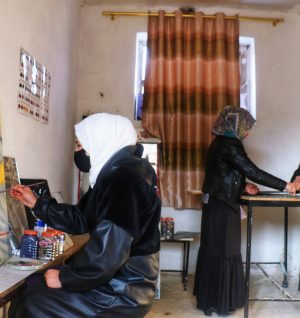
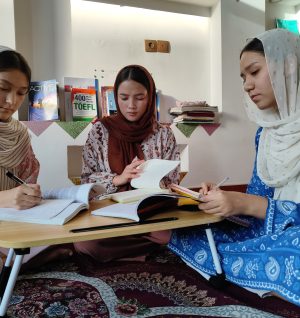
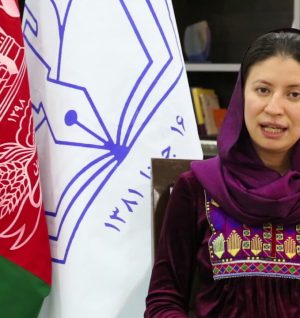
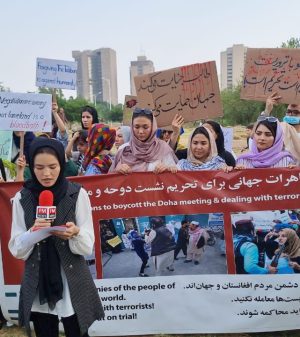
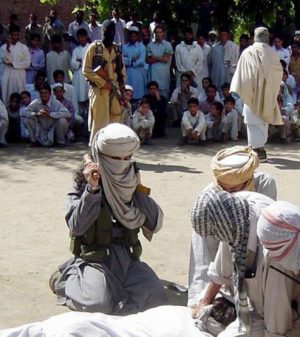
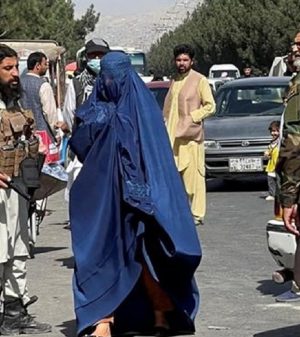
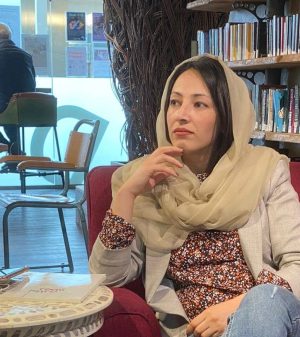
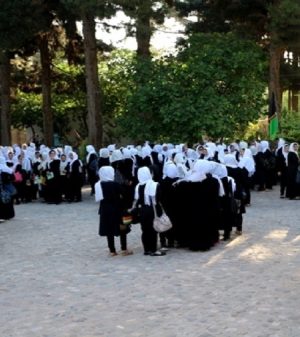
Add Comment